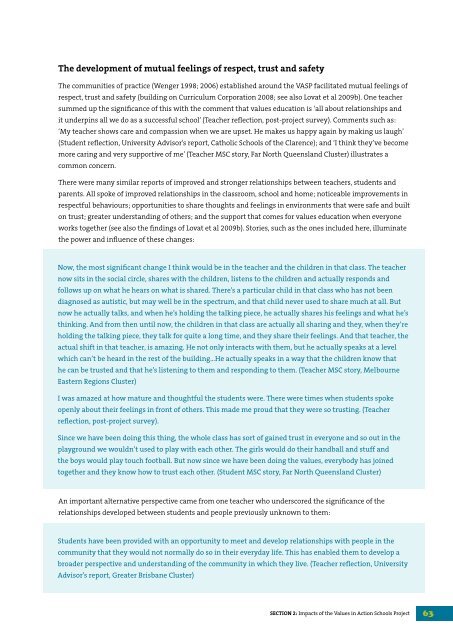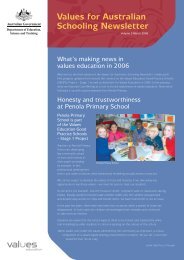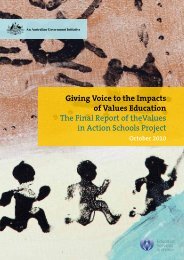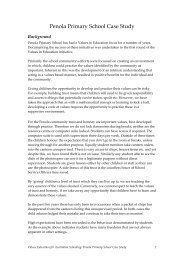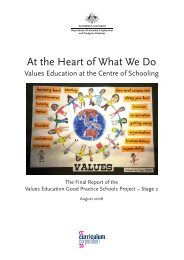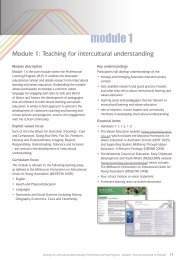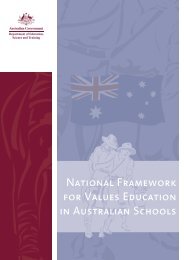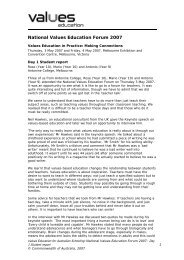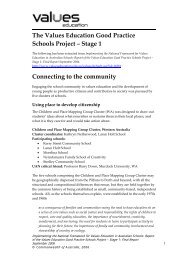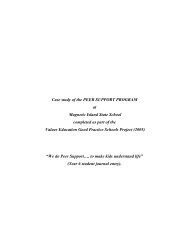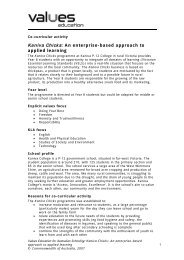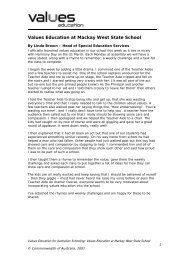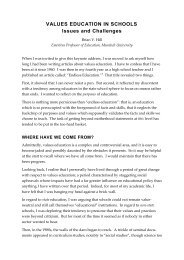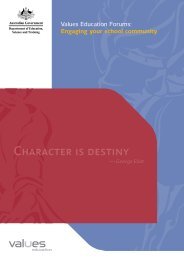Giving Voice to the Impacts of Values Education The Final Report of ...
Giving Voice to the Impacts of Values Education The Final Report of ...
Giving Voice to the Impacts of Values Education The Final Report of ...
You also want an ePaper? Increase the reach of your titles
YUMPU automatically turns print PDFs into web optimized ePapers that Google loves.
<strong>The</strong> development <strong>of</strong> mutual feelings <strong>of</strong> respect, trust and safety<br />
<strong>The</strong> communities <strong>of</strong> practice (Wenger 1998; 2006) established around <strong>the</strong> VASP facilitated mutual feelings <strong>of</strong><br />
respect, trust and safety (building on Curriculum Corporation 2008; see also Lovat et al 2009b). One teacher<br />
summed up <strong>the</strong> significance <strong>of</strong> this with <strong>the</strong> comment that values education is ‘all about relationships and<br />
it underpins all we do as a successful school’ (Teacher reflection, post-project survey). Comments such as:<br />
‘My teacher shows care and compassion when we are upset. He makes us happy again by making us laugh’<br />
(Student reflection, University Advisor’s report, Catholic Schools <strong>of</strong> <strong>the</strong> Clarence); and ‘I think <strong>the</strong>y’ve become<br />
more caring and very supportive <strong>of</strong> me’ (Teacher MSC s<strong>to</strong>ry, Far North Queensland Cluster) illustrates a<br />
common concern.<br />
<strong>The</strong>re were many similar reports <strong>of</strong> improved and stronger relationships between teachers, students and<br />
parents. All spoke <strong>of</strong> improved relationships in <strong>the</strong> classroom, school and home; noticeable improvements in<br />
respectful behaviours; opportunities <strong>to</strong> share thoughts and feelings in environments that were safe and built<br />
on trust; greater understanding <strong>of</strong> o<strong>the</strong>rs; and <strong>the</strong> support that comes for values education when everyone<br />
works <strong>to</strong>ge<strong>the</strong>r (see also <strong>the</strong> findings <strong>of</strong> Lovat et al 2009b). S<strong>to</strong>ries, such as <strong>the</strong> ones included here, illuminate<br />
<strong>the</strong> power and influence <strong>of</strong> <strong>the</strong>se changes:<br />
Now, <strong>the</strong> most significant change I think would be in <strong>the</strong> teacher and <strong>the</strong> children in that class. <strong>The</strong> teacher<br />
now sits in <strong>the</strong> social circle, shares with <strong>the</strong> children, listens <strong>to</strong> <strong>the</strong> children and actually responds and<br />
follows up on what he hears on what is shared. <strong>The</strong>re’s a particular child in that class who has not been<br />
diagnosed as autistic, but may well be in <strong>the</strong> spectrum, and that child never used <strong>to</strong> share much at all. But<br />
now he actually talks, and when he’s holding <strong>the</strong> talking piece, he actually shares his feelings and what he’s<br />
thinking. And from <strong>the</strong>n until now, <strong>the</strong> children in that class are actually all sharing and <strong>the</strong>y, when <strong>the</strong>y’re<br />
holding <strong>the</strong> talking piece, <strong>the</strong>y talk for quite a long time, and <strong>the</strong>y share <strong>the</strong>ir feelings. And that teacher, <strong>the</strong><br />
actual shift in that teacher, is amazing. He not only interacts with <strong>the</strong>m, but he actually speaks at a level<br />
which can’t be heard in <strong>the</strong> rest <strong>of</strong> <strong>the</strong> building…He actually speaks in a way that <strong>the</strong> children know that<br />
he can be trusted and that he’s listening <strong>to</strong> <strong>the</strong>m and responding <strong>to</strong> <strong>the</strong>m. (Teacher MSC s<strong>to</strong>ry, Melbourne<br />
Eastern Regions Cluster)<br />
I was amazed at how mature and thoughtful <strong>the</strong> students were. <strong>The</strong>re were times when students spoke<br />
openly about <strong>the</strong>ir feelings in front <strong>of</strong> o<strong>the</strong>rs. This made me proud that <strong>the</strong>y were so trusting. (Teacher<br />
reflection, post-project survey).<br />
Since we have been doing this thing, <strong>the</strong> whole class has sort <strong>of</strong> gained trust in everyone and so out in <strong>the</strong><br />
playground we wouldn’t used <strong>to</strong> play with each o<strong>the</strong>r. <strong>The</strong> girls would do <strong>the</strong>ir handball and stuff and<br />
<strong>the</strong> boys would play <strong>to</strong>uch football. But now since we have been doing <strong>the</strong> values, everybody has joined<br />
<strong>to</strong>ge<strong>the</strong>r and <strong>the</strong>y know how <strong>to</strong> trust each o<strong>the</strong>r. (Student MSC s<strong>to</strong>ry, Far North Queensland Cluster)<br />
An important alternative perspective came from one teacher who underscored <strong>the</strong> significance <strong>of</strong> <strong>the</strong><br />
relationships developed between students and people previously unknown <strong>to</strong> <strong>the</strong>m:<br />
Students have been provided with an opportunity <strong>to</strong> meet and develop relationships with people in <strong>the</strong><br />
community that <strong>the</strong>y would not normally do so in <strong>the</strong>ir everyday life. This has enabled <strong>the</strong>m <strong>to</strong> develop a<br />
broader perspective and understanding <strong>of</strong> <strong>the</strong> community in which <strong>the</strong>y live. (Teacher reflection, University<br />
Advisor’s report, Greater Brisbane Cluster)<br />
Section 2: <strong>Impacts</strong> <strong>of</strong> <strong>the</strong> <strong>Values</strong> in Action Schools Project<br />
63


